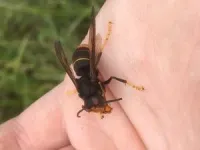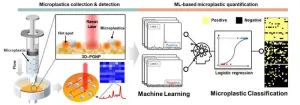(Press-News.org) A new paper in Molecular Biology and Evolution, published by Oxford University Press, for the first time provides a comprehensive set of genomic resources for pangolins, sometimes known as scaly anteaters, that researchers believe will be integral for protecting these threatened mammals.
Pangolins, which are found in Asia and sub-Saharan Africa, are the only mammals covered in scales. They are trafficked at record numbers for their meat and supposed medicinal properties. The animals are also at risk due to widespread deforestation of their native habitats. Pangolins are made up of eight surviving species that have become of great public interest and conservation efforts in recent years. This is mainly due to them being the most trafficked wild mammals on Earth and the recent (incorrect) suggestion that they may have been linked to the COVID-19 pandemic.
Despite their dire conservation circumstances, pangolins are understudied, with major gaps remaining in basic species or population research. Researchers are now focusing increasingly on genomics in wildlife research because it provides data for more accurate information on species or population demarcation, demographic information, diversity, historical trajectories, and animals’ adaptive capacity to global changes. Not to mention its potential in tracing the origins of illegally traded individuals for better determining poaching hotspots and disrupting trafficking networks.
Producing genome-wide information about pangolins is a challenging task. First, the geographic isolation of pangolin species from each other and limited fossil records pose methodological obstacles. The Asian and African pangolin species diverged some 37.9 million years ago, making it difficult to truly understand the group’s evolution when using a reference genome of a distant species. Second, the animals’ elusive behavior and tropical distributions make genetic sampling expensive and time-consuming.
Researchers here sequenced, assembled, and annotated the first reference genome for giant pangolin, which is native to Africa, and also sequenced and assembled genomes for the black-bellied, Temminck’s, Indian, and Philippine pangolins. These new genomic data, along with previously published information on the remaining three species—the white-bellied, Sunda, and Chinese pangolins—provide the first complete set of genomes for pangolins. During this process, researchers here also identified a potentially new pangolin species from previously released genomic data.
The researchers believe that this information, which will eventually provide complete information about how pangolins evolved over time in response to changing environmental conditions, will provide crucial information about how to protect the animals effectively through conservation priorities and management plans in coming years. The outputs will also be useful for developing DNA toolkits for tracing the pangolin trade.
“The collaborative manner of this study from authors spanning Africa, Asia, and Europe allowed us for the first time to have a deep look into pangolin evolution across all eight species using a genome-wide lens,” said Sean Heighton, one of the paper’s authors. “We hope that these genomes will be the basis for further genetic research that will aid in conservation of the animals.”
The paper, “Pangolin genomes offer key insights and resources for the world's most trafficked wild mammals,” is available (at midnight on October 5th) at: https://academic.oup.com/mbe/article-lookup/doi/10.1093/molbev/msad190.
Direct correspondence to:
Sean P. Heighton or Philippe Gaubert
Laboratoire Evolution et Diversité Biologique— IRD-UPS-CNRS
Université Toulouse
118 route de Narbonne
Bât. 4R1, 31062 Toulouse, France
sean.heighton@gmail.com or philippe.gaubert@univ-tlse3.fr
To request a copy of the study, please contact:
Daniel Luzer
daniel.luzer@oup.com
END
New research into pangolin genomics may aid in conservation efforts
2023-10-05
ELSE PRESS RELEASES FROM THIS DATE:
Can masculine marketing convince more men to eat vegan?
2023-10-05
Eating more plant-based meals is better for our health and better for the planet. But cultural preferences are significant barriers to reducing meat consumption - especially for men, who are underrepresented among vegans and vegetarians. Studies have found that eating meat is associated with masculinity, and that gender stereotypes label plant-based diets as suitable for women but not men. So is it possible to change the perception of plant-based food with marketing, and convince men to eat more of it?
“Men might be less inclined to consume vegan food due to the need to perform gender,” said Alma Scholz, lead author of a new study published in Frontiers in Communication. ...
Detecting microplastics(MPs) with light!!
2023-10-05
A research team led by Dr. Ho Sang Jung of the Department of Nano-Bio Convergence at the Korea Institute of Materials Science (KIMS), a government-funded research institute under the Ministry of Science and ICT, in collaboration with the KOTITI Testing & Research Institute, has developed the world's first technology to rapidly and highly sensitively detect microplastics(MPs) in the field, which are well known to cause human and genetic toxicity through environmental pollution and the food chain.
The on-site applicable MPs detection technology developed ...
Comfort with a smaller carbon footprint
2023-10-05
Osaka, Japan – As organizations work to reduce their energy consumption and associated carbon emissions, one area that remains to be optimized is indoor heating and cooling. In fact, HVAC – which stands for Heating, Ventilation, and Air Conditioning – represents, on average, about 40% of a building’s total energy use. Methods that conserve electricity while still providing a comfortable indoor environment for workers could make a significant difference in the fight against climate change.
Now, researchers from Osaka University have demonstrated significant energy savings through the application of a new, AI-driven algorithm ...
Study shows enhanced pandemic-related infection prevention and control practices reduced incidence of healthcare-associated infections
2023-10-05
A new study conducted by researchers at The University of Texas MD Anderson Cancer Center suggests that enhanced infection prevention and control (IPC) measures implemented to address the COVID-19 pandemic contributed to a significant decrease in many healthcare-associated infections (HAIs) and a reduction in respiratory viral infections (RVIs). The findings, published today in the American Journal of Infection Control (AJIC), provide some of the first evidence that strict pandemic-related IPC interventions reduced HAI rates among vulnerable patient populations.
“Previous, large-scale ...
New study reveals Australian Long COVID response lagging
2023-10-05
New research by RMIT University and Northern Health has examined Australia’s Long COVID services, guidelines and public health information, compared with international standards.
The researchers found Australia lacking in several categories, including early investigation, accessibility and availability of trustworthy public health information, and adequate multidisciplinary Long COVID services to meet demand.
Dean of RMIT’s School of Health and Biomedical Sciences and co-author on the paper, Professor Catherine Itsiopoulos, warned that this problem will only worsen over time.
“Long ...
Vaccine via the nasal passage could be the new line of defence against Strep A
2023-10-05
As Streptococcus A cases continue to be prevalent in Queensland and internationally, a new nasal vaccine could provide long-term protection from the deadly bacteria.
Associate Professor Manisha Pandey, Professor Michael Good, and their team from Griffith University’s Institute for Glycomics, are leading the development of a Strep A vaccine which is currently in Phase 1 clinical trials in Canada and quickly advancing to Phase 2 efficacy trials.
The team’s new preclinical research, recently published in Nature Communications, shows an experimental liposome-based vaccine approach incorporating a conserved M-protein epitope from Strep A and an immunostimulatory glycolipid (3D(6-acyl) ...
Mays Cancer Center at UT Health San Antonio identifies possible markers for early metastatic lung cancer
2023-10-05
SAN ANTONIO, Oct. 5, 2023 – Researchers at Mays Cancer Center at The University of Texas Health Science at San Antonio (UT Health San Antonio) have identified protein markers that could signal for early development of metastatic lung cancer, providing possibilities for new treatment.
The findings already have led to a five-year, $1.6 million grant from the National Cancer Institute of the National Institutes of Health that will pave the way for a clinical trial next year for patients with advanced lung cancer. The research is detailed in a new article in Cell Reports, ...
WHO director praises London’s ULEZ expansion as politically courageous
2023-10-05
London mayor Sadiq Khan’s efforts to expand the capital’s Ultra Low Emission Zone (ULEZ) as part of a push to reduce air pollution and improve health, is politically courageous and an example for mayors around the world, says the World Health Organization’s environment, climate change and health director, Maria Neira.
In an exclusive interview for The BMJ’s climate issue, Neira says she is tired of listening to politicians speak on climate change as if they didn't have the power to ...
Software can detect hidden and complex emotions in parents
2023-10-05
Researchers have conducted trials using a software capable of detecting intricate details of emotions that remain hidden to the human eye.
The software, which uses an ‘artificial net’ to map key features of the face, can evaluate the intensities of multiple different facial expressions simultaneously.
The University of Bristol and Manchester Metropolitan University team worked with Bristol’s Children of the 90s study participants to see how well computational methods could capture authentic human emotions amidst everyday ...
$2 million grant boosts technological advancements in cutting-edge cell therapy manufacturing facility
2023-10-05
The Keck School of Medicine of USC has received $2 million from the California Institute of Regenerative Medicine (CIRM) to further augment its newly launched cGMP Laboratory, a state-of-the-art facility designed to advance early-stage research into clinically viable cell and gene therapies. To expedite the translation of these therapies from the lab to the clinic, the facility needs advanced technological know-how, streamlined operations and strict protocols for developing and testing these products, all of which ...






